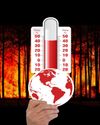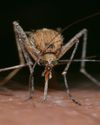
These changes can worsen health problems; cancer is one of the outrageous health concerns. For instance, higher temperatures and heatwaves can lead to increased exposure to harmful UV radiation and pollutants, which are known risk factors for various cancers, including ovarian cancer. This article will provide evidence of how the climate crisis is causing ovarian cancer imperatively.
Ovarian cancer is a type of cancerous tumor that starts in different cells within the ovary, a crucial part of the female reproductive system. Various forms include epithelial, germ cell, stromal tumors, and primary peritoneal cancer. Around 300,000 new cases are diagnosed each year, making ovarian cancer a significant public health issue because of its high death rate. It ranks as the eighth most common cause of cancer mortality for women's globally, leading to around 185,000 deaths annually.
Incidence and mortality of ovarian cancer differ depending on the region, with higher-income countries showing higher incidence rates. Risk factors for ovarian cancer can be influenced by genetics, family history, reproductive history, hormone replacement therapy, and lifestyle decisions. Climate change identified by prolonged alterations in Earth's climate system, primarily caused by a rise in greenhouse gases such as carbon dioxide and methane. It is crucial to understand the connection between climate change and public health, which also includes possible effects on the epidemiology of ovarian cancer. This study looks to examine the potential links between climatic change and epidemiology of ovarian cancer, delving into the impact of increasing temperatures and heat waves on ovarian cancer incidence and prognosis.
Bu hikaye Scientific India dergisinin November - December 2024 sayısından alınmıştır.
Start your 7-day Magzter GOLD free trial to access thousands of curated premium stories, and 9,000+ magazines and newspapers.
Already a subscriber ? Giriş Yap
Bu hikaye Scientific India dergisinin November - December 2024 sayısından alınmıştır.
Start your 7-day Magzter GOLD free trial to access thousands of curated premium stories, and 9,000+ magazines and newspapers.
Already a subscriber? Giriş Yap

Building world's 1st pyramid
In a preprint study published this summer, researchers proposed that ancient Egyptians built the world's first pyramid the 4,700-year-old Step Pyramid of Djoser, which sits on Egypt's Saqqara plateau using a \"modern hydraulic system\" powered by a long-gone branch of the Nile River.

Climate change arms the world, ovarian cancer pulls the trigger.It's time we disarm them both
Climate change, driven by human activities, leads to environmental changes such as rising temperatures, altered weather patterns, and increased pollution.

Climate Change Added 18 mph to Hurricane Wind Speeds over Past 5 Years
High ocean temperatures caused by global warming boosted maximum intensities for most storms between 2019 and 2023, as well as for every 2024 hurricane.

How Indian Vulture Decline Led to 500,000 Deaths in 5 Years
Once a common sight across India, vultures were abundant scavengers, often seen circling landfills in search of carcasses.

Understanding Monkeypox: Insights and Implications
Monkeypox, a viral zoonotic disease, has gained significant attention in recent years due to its re-emergence and sporadic outbreaks globally.

AI predicts that most of the world will see temperatures rise to 3°C much faster than previously expected
Three leading climate scientists have combined insights from 10 global climate models and, with the help of artificial intelligence (AI), conclude that regional warming thresholds are likely to be reached faster than previously estimated.

Infrared Radiation: A New Player In Mosquito Host-Seeking
The sound of mosquitoes is all around us when the sun sets and the air gets warm and sweltering.

Fish Oil May Benefit to Cure Alzheimer's, disorder: new findings
The benefits of fish and fish oil consumption are well-known in medical science as fish is considered a precious food resource that provides sufficient nutrition to humans.

A new class of antivirals could help prevent future pandemics
The arrival of Paxlovid in December 2021 marked another turning point in the COVID-19 pandemic an effective antiviral that has since successfully treated millions.

Turning carbon emissions into methane fuel
Chemists have developed a novel way to capture and convert carbon dioxide into methane, suggesting that future gas emissions could be converted into an alternative fuel using electricity from renewable sources. Carbon dioxide (CO2) is a greenhouse gas that accounts for a large part of Earth's warming climate, and is produced by power plants, factories and various forms of transportation.